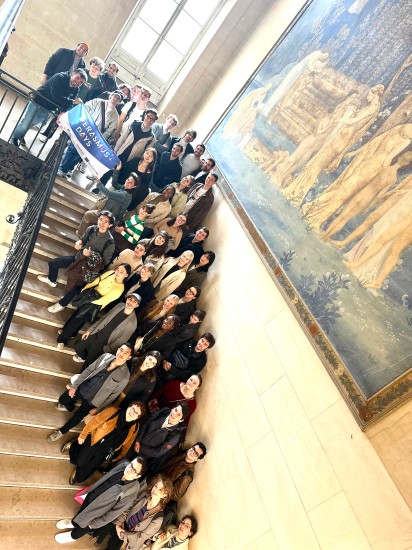ECTS
180 crédits
Durée
3 ans
Composante
École d'économie de la Sorbonne (EES)
Langue(s) d'enseignement
Anglais
Présentation
Licence Economics - International Track
(Undergraduate Degree in Economics)
The Licence in Economics - International Track is the Undergraduate Degree in Economics (Taught in English) at the Sorbonne School of Economics.
Pour une présentation en Français, cliquez ici.
The Sorbonne School of Economics opened it's latest course offering, the Undergraduate degree program in Economics, in September 2025. It is a national degree (Licence Economics) fully taught in English, designed for both French and international students. This program welcomes 250 students in the first year and offers a unique opportunity to study Economics at one of France's top universities, with affordable tuition fees.
The Licence of Economics – International Track is an Undergraduate degree in Economics. It is a new track within the existing undergraduate degree of Economics program at the Sorbonne School of Economics.
This program supports the university’s strategy to expand its international offerings and meet the growing demand for high-quality, English-taught programs in Economics. It allows students to pursue an international education with low tuition fees (175 euros per year + 105 euros CVEC) (estimated per year based on tuition fee from 2025-2026 for EU students and those benefiting from tuition fee exonerations). For details on differentiated tuition fees check here.
- Come visit us during the Open Day which will take place on February 14th at Center PMF (Paris 13th arrondissement, 31 rue de Baudricourt, 75013 Paris). https://www.pantheonsorbonne.fr/evenements/journees-portes-ouvertes-2026
Objectifs
The undergraduate program in Economics at Sorbonne School of Economics is designed to provide a solid foundation in economic theory, while offering a broad perspective on the social sciences. The curriculum includes a balance of theoretical and applied courses, all taught entirely in English within the international track.
Program Overview:
-
Core Courses: The program follows the same curriculum as the general economics track, but all courses are taught in English. Students will explore both fundamental theoretical subjects such as Introduction to Economics, History of Economic Thought, Microeconomics, and Macroeconomics, alongside more applied and descriptive courses, including Comparative Economic Theories, European Economics and Policies, Social Protection, Monetary and Financial Economics, and Sustainable Development Economics.
-
Quantitative Skills: A strong emphasis is placed on developing quantitative and analytical skills with courses like Mathematics for Economists, Matrix Calculations and Optimization,Probability and Statistics and econometrics.
-
Global Perspective: Students in the international track will gain a global perspective on economics, benefiting from courses entirely taught in English. This track is ideal for those who aim to develop an international outlook and pursue careers in the global economy.
English Language Requirements and Support:
- A minimum English level of B2 is required for admission, with the goal of advancing to a C1/C2 level by the end of the program.
- Additional support will be available for students with limited proficiency in English to ensure they succeed in the program.
International Mobility:

- The program encourages international mobility, offering students the chance to study abroad in the second or third year, although this is not mandatory.
- Thanks to numerous international partnerships, students can choose from 98 destinations for exchange programs, enhancing their global experience and broadening their academic network.
Excellent Preparation for further Graduate Studies:
The undergraduate degree in Economics is designed as an excellent preparation for further studies at the graduate level, particularly in economics and related fields

Savoir-faire et compétences
Key Skills Developed in the Economics Program:
1. Ability to Analyze Economic Data:
- Learn how to collect, process, and interpret economic data using statistical software such as Excel and R.
2. Proficiency in Economic Modeling Tools:
- Use economic models to formulate and test hypotheses on economic issues (e.g., modeling markets, consumer behavior, etc.).
3. Writing and Communication:
- Develop the ability to write clear and well-argued economic analyses.
- Be able to present results in a structured manner, both in writing and orally.
4. Critical Thinking:
- Develop the ability to analyze and critique existing economic policies and theories.
- Identify the limitations of theoretical models and data used in economic analysis.
5. Teamwork and Collaboration:
- Ability to work in teams, often in multidisciplinary projects or case studies.
6. Proficiency in IT Tools:
Competence in economic software, data processing and statistical tools, as well as database management.
7. Learn and Work in English in an international environment
Career Prospects:
In addition to these skills, the Economics undergraduate program at Sorbonne School of Economics prepares students for a wide range of careers in fields such as finance, economic analysis, market research, public management, international organizations, and consulting.
These skills and knowledge aim to provide students with a solid theoretical foundation while also developing their ability to apply theory to practical situations.

Les + de la formation
Expand Your Horizons, Learn in English, and Take Your First Step Toward a Global Career in Economics – All from the Heart of Paris.
You’ll have the opportunity to study at one of France’s top universities specializing in economics, located right in the heart of Paris. With campuses in the 5th and 13th districts, you’ll experience life in one of the world’s most dynamic and historic cities. At Paris 1 Panthéon-Sorbonne, Paris is your campus—immersed in a rich culture, a thriving academic environment, and countless opportunities for learning and exploration.
A Unique Educational Experience
This Economics Bachelor's Degree – International Track offers a unique educational experience in France, providing a global study program at an affordable price while ensuring accessibility and excellence. With the prestige of the Sorbonne and its international visibility, this program is perfect for students who want to receive a top-tier education without the financial burden of studying abroad.
Organisation
Membres de l’équipe pédagogique
Lorenzo Cassi, Director of the program
Programme
First year of the program opened in 2025-2026
Second year of the program opens in 2026-2027
Third year of the program opens in 2027-2027.
The Licence Economics - International Track offers 180 ECTS after three years of studies.
The courses offered in the International track align with the content of the general Economics track but will be taught entirely in English. Students will have several minor options to choose from, including:
- A minor taught in French (management, geography, law, philosophy, sociology, history)
- Microcredentials on Sustainability (offered by UNA Europa)
Language and Mobility
- Students should have a minimum B2 level in English. The goal is to bring them to a level C1/C2.
- Students will have the option to take specialized English-language courses like Economic English. Specific support will be provided for students with limited skills in English
- The program encourages international mobility during the second or third year, but this is not mandatory. With numerous international agreements in place, students can choose from 98 destinations for exchange programs.
Sélectionnez un programme
Licence 1ère année Economie - International track
Facultatif
Théâtre
18hUE1 Approche analytique
10 créditsEconomic History
4 crédits24hIntroduction to Econometrics
6 crédits
UE2 Approche thématique
5 créditsTopics in economics
5 crédits36h
UE3 Outils quantitatifs
12 créditsUE4 Mineures et langues
3 créditsChoix mineure
Au choix: parmi
Histoire économique première révolution insdustrielle
2 crédits18hIntroduction générale au droit et aux institutions juridict
2 crédits18hMathématiques: Fondements pour économistes
6 crédits24hMineure gestion : Introduction à l'économie d'entreprise
2 crédits18hMineure informatique : Introduction à la gestion de bases de
2 crédits3hMineure Philosophie : Philosophie politique et morale
18hMineure sociologique : Sciences sociales
2 crédits18hUNA Europa Microcredentials in Sustainability :
2 crédits
LV1
1 crédits
Facultatif
Cogite la Planète
Cogiteco
15hLes métiers de l'économiste
15hThéâtre
UE1 Approche analytique
12 créditsComparative Economic Theories: Value and Distribution
4 crédits42hMacroeconomics : European National Accounts
4 crédits36hMicroeconomics I : the producer and the consumer
4 crédits36h
UE2 Approche thématique
7 créditsInternational Economics : Introduction
3 crédits24hSocial Protection
4 crédits39h
UE3 Outils quantitatifs
4 créditsDE Mathematics for Economists (2)
18hMathematics for Economists (2)
4 crédits12h
UE4 Mineures et langues
3 créditsChoix d'une langue vivante - semestre 2
1 créditsChoix mineure
Au choix: parmi
Autonomisation de l'économie
18hHistoire du droit économique
2 crédits18hHistoire économique première révolution insdustrielle
18hProgrammation 1 : Introduction
2 crédits15hSociétés et activités locales
2 crédits18hSociologie des groupes sociaux
2 crédits18hUNA Europa Microcredentials in Sustainability :
2 crédits
TEDS
UE5 : Methodes et Professionnalisation
4 créditsDigital Skills (Pix)
2 crédits8hWritten and oral skills in English
2 crédits15,5h
Licence 2ème année International track
Licence 3ème année International track
Admission
Conditions d'admission
English Language Requirement
As the Licence of Economics – International Track is taught entirely in English, applicants must demonstrate sufficient proficiency in the English language to ensure successful participation in the program.
A minimum level of B2 on the Common European Framework of Reference for Languages (CEFR) is required for admission.
Accepted English Language Tests
Applicants may demonstrate their English level by providing results from one of the following internationally recognized tests:
|
Test |
Minimum score required |
|---|---|
|
IELTS Academic |
6.0 overall |
|
TOEFL iBT |
80 overall |
|
Cambridge English |
B2 First (FCE), grade A–C |
|
TOEIC (Listening and Reading) |
785 overall |
Modalités d'inscription
Admissions: How to apply ?
Apply on Parcoursup (January to March 2026) if you are:
- French.
- A citizen of the European Economic Area (EEA), of Andorra, Monaco or Switzerland. Please note that UK citizens can't apply through the Parcoursup platform anymore.
- A non-EU national but you hold a French baccalauréat or the European Baccalaureate diploma.
You are not an EEA national and you hold a foreign high school diploma:
- If you live in France, apply through the "dossier vert" from the DAP procedure (from 1 November to 15th December 2025).
- If you live in a foreign country using the Campus France application platform, apply through the Études en France platform (from 10th November to 15th December 2025).
- If you live in a foreign country that does not use the Campus France application platform, apply through the "dossier blanc" from the DAP procedure (from 10th November to 15th December 2025).
Webpage Parcoursup for the program
Frequently Asked Questions (FAQ) Parcoursup
Webpage Campus France for the program
What you should provide to apply:
- High school results, high school diploma (if obtained). English language certificate IELTS, TOEFL or Cambridge (optional for students applying on ParcourSup).
Tarifs
University Fees :
€175 (for the 2024-2025 academic year) + CVEC*
*The CVEC (Contribution to Student Life and Campus) is an annual mandatory fee of €105 paid by students in France to fund services and initiatives that support student life and well-being on campus. This amount is determined by the French governent before the start of the school year.
Everything you need to know about university fees
RNCP
Certification : LICENCE - Économie (fiche nationale)
Date d'enregistrement : 12/07/2021
Date d'échéance : 30/06/2029
Certificateur : Université Paris 1 Panthéon-Sorbonne
Et après
Poursuite d'études
You can apply to any master program in Economics in France or worldwide. Sorbonne School of Economics offers a wide range of master programs in French or in English :
Pantheon Sorbonne Master in Economics (PSME) in english, with Tracks in Development Economics, Financial Economics and International Economics
Master Development Economics and Sustainable Development
Master Economics and Psychology
Master “Analyse et Politique Économique" (at Paris School of Economics)
Master économie Internationale et Environnement
Master Monnaie Banque Finance et Assurance (Financial Economics Track in M2)


